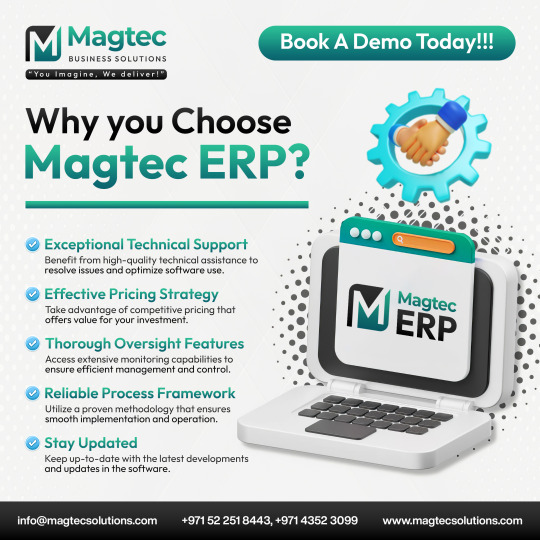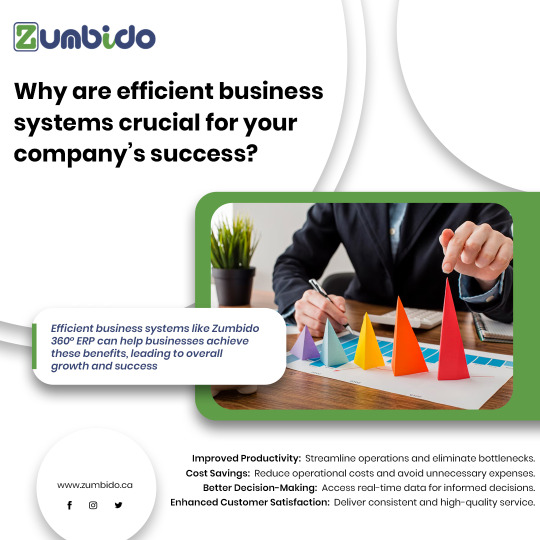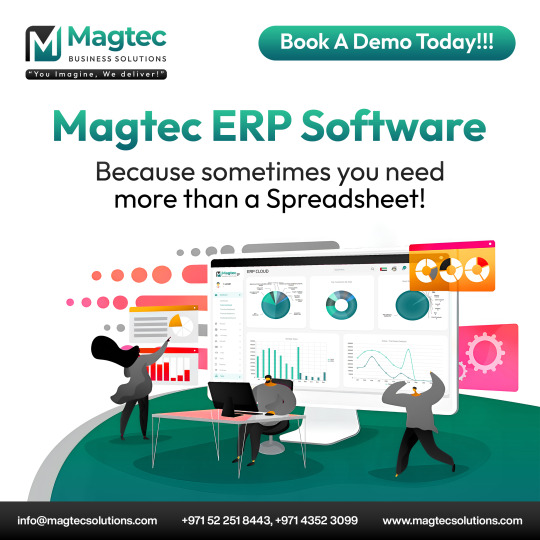#business solutions software
Explore tagged Tumblr posts
Text
Top 10 ERP software provider in India | shantitechnology
STERP (shantitechnology) is a leading ERP solution provider in Pune, delivering industry-focused ERP for manufacturing companies in Pune. As one of the top 10 ERP software providers in India, we specialize in streamlining operations with cutting-edge manufacturing ERP software in Pune. Trusted among the best ERP software providers in Pune, we empower businesses with seamless automation and efficiency.
Choose STERP – one of the most reliable ERP software companies in Pune for unmatched enterprise solutions!
#ERP for manufacturing company in Pune#Manufacturing ERP software in Pune#ERP solution providers in Pune#India#ERP software providers in Pune#Pune#Mumbai#Maharashtra#ERP software companies in Pune#Top 10 ERP software provider in India#ERP solution#ERP software#Cloud ERP#Business Solution#MSME#SME#business analyst#business analysis#ERP software provider
5 notes
·
View notes
Text
Microsoft Dynamics 365 Finance & Operations Partner | D365 Finance Software | JRS Dynamics Info Solutions
Streamline your financial and operational processes with Microsoft Dynamics 365 Finance & Operations, delivered by JRS Dynamics – a trusted D365 consultant in India and USA!
Why Choose JRS Dynamics for Dynamics 365 Finance?
✅ Expert Implementation ✅ Comprehensive Consulting & Support ✅ Global Reach ✅ Industry-Specific Customizations
Empower your business with advanced financial tools, real-time analytics, and streamlined operations.
Learn more about our services at: https://jrsdynamics.com/consultation-finance-and-operations/
Partner with JRS Dynamics to optimize your business with Microsoft Dynamics 365 Finance & Operations.
#financeandoperations#finance#business#ERP Software Company#Software Development Company#it solutions#it services#digitaltransformation#microsoftdynamics365#businessmanagement#businesssuccess#jrsdynamics
2 notes
·
View notes
Text

#Software development#custom software solutions#innovative software development#software company in India#business software solutions#creative software development.
2 notes
·
View notes
Text

Streamline your business operations with Magtec ERP! 🚀 We offer exceptional technical support, competitive pricing, thorough oversight features, a reliable process framework, and stay up-to-date with the latest software developments. 💻 Book a demo today and see how Magtec ERP can transform your business! ✨
#magtec#erp#automation#business#efficiency#software#technology#innovation#digitaltransformation#enterprise#solutions#productivity#success#growth#management#finance#humanresources#supplychain#logistics#cloud#saas#onpremises#hybrid#integration#scalability#customization#support#trustedpartner#magtecerp#magtecsolutions
2 notes
·
View notes
Text
What is ERP and Why Your Small Business Needs It?
Running a small business is a challenging but rewarding endeavor. You wear many hats, juggle countless tasks, and constantly strive for growth. But as your business expands, managing everything with spreadsheets and disconnected software can become a major bottleneck. That's where Enterprise Resource Planning (ERP) systems come in.
What Exactly is an ERP?
Think of an ERP system as the central nervous system of your business. It's a type of software that integrates all your core business processes into a single, unified platform. This means your sales, inventory, accounting, human resources, and other departments can all access and share the same data in real-time.... Read More
#coquicloud#business#businesstips#entrepreneurs#odoo#technologies#techtips#software#saas#small business#business management#business consulting#efficiency#innovation#digitaltransformation#technologynews#productivitytips#cloud solutions#Coqui Cloud#Latino Businesses#Odoo Implementation#technews#Odoo Support#business automation#CRM#Accounting#Inventory Management
2 notes
·
View notes
Text

3 notes
·
View notes
Text
HRMS System: 7 Powerful Ways It Can Transform Your Business Operations

In today's fast-paced business environment, efficiency and productivity are paramount. One way businesses are achieving these goals is by leveraging Human Resource Management Systems (HRMS). These systems have evolved from simple employee databases to comprehensive tools that can revolutionize how businesses operate. In this blog, we'll explore seven ways an HRMS system can transform your business operations.
1. Streamlined Recruitment Process
Recruiting top talent is a critical function of any HR department. An HRMS system can significantly streamline the recruitment process by automating many of the tasks involved. From posting job ads to tracking applications and scheduling interviews, an HRMS can handle it all.
Automation of Administrative Tasks
HRMS systems can automate repetitive administrative tasks, freeing up HR professionals to focus on more strategic activities. For example, an HRMS can automatically screen resumes based on predefined criteria, schedule interviews, and send out automated emails to candidates.
Enhanced Candidate Experience
A streamlined recruitment process not only benefits HR but also improves the candidate experience. An HRMS system provides a seamless application process, timely communication, and easy access to information, enhancing the overall candidate experience.
Data-Driven Decision Making
HRMS systems provide detailed analytics and reporting capabilities that can help HR professionals make data-driven decisions. For example, an HRMS can track the source of the most successful hires, helping HR to focus their recruitment efforts on the most effective channels.
2. Improved Employee Onboarding
Employee onboarding is a crucial step in the employee lifecycle. A well-structured onboarding process can lead to higher employee satisfaction and retention rates. An HRMS system can revolutionize the onboarding process by automating and streamlining it.
Personalized Onboarding Plans
An HRMS system can create personalized onboarding plans for new hires, ensuring that they receive the training and resources they need to succeed in their roles. This can include automated workflows, task lists, and access to relevant documents and training materials.
Seamless Integration
An HRMS system can integrate with other systems used by the company, such as payroll and benefits administration, ensuring that new hires are set up in all necessary systems from day one. This reduces the administrative burden on HR and ensures a smooth onboarding process.
Ongoing Support
An HRMS system can provide ongoing support to new hires through self-service portals and access to training materials. This helps new employees quickly get up to speed and feel supported as they transition into their new roles.
3. Enhanced Employee Engagement
Employee engagement is a key driver of productivity and retention. An HRMS system can help improve employee engagement in several ways.
Performance Management
An HRMS system can provide tools for continuous performance management, including goal setting, performance reviews, and feedback. This helps employees stay aligned with company objectives and receive regular feedback on their performance.
Employee Recognition
An HRMS system can include employee recognition programs, allowing employees to recognize and reward their peers for their contributions. This can boost morale and create a positive work environment.
Employee Surveys
An HRMS system can facilitate regular employee surveys to gather feedback on various aspects of the workplace. This feedback can be used to identify areas for improvement and take action to address employee concerns.
4. Efficient Payroll and Benefits Administration
Payroll and benefits administration can be time-consuming and complex. An HRMS system can streamline these processes and ensure accuracy and compliance.
Automated Payroll Processing
An HRMS system can automate payroll processing, ensuring that employees are paid accurately and on time. This includes calculating wages, taxes, and deductions, and generating pay stubs.
Benefits Administration
An HRMS system can simplify benefits administration by providing a self-service portal where employees can enroll in and manage their benefits. This reduces the administrative burden on HR and ensures that employees have easy access to their benefits information.
Compliance
An HRMS system can help ensure compliance with various labor laws and regulations by automating compliance-related tasks and providing regular updates on changes in legislation. This reduces the risk of non-compliance and associated penalties.
5. Data Management and Analytics
Data is a valuable asset for any business. An HRMS system can help manage and analyze HR data to provide valuable insights.
Centralized Data Management
An HRMS system provides a centralized repository for all HR data, making it easy to access and manage. This includes employee records, payroll information, benefits data, and more.
Advanced Analytics
An HRMS system can provide advanced analytics capabilities, allowing HR professionals to analyze data and identify trends. For example, an HRMS can track employee turnover rates, identify the causes of turnover, and develop strategies to improve retention.
Data Security
An HRMS system ensures the security and confidentiality of HR data by implementing robust security measures. This includes data encryption, access controls, and regular security audits.
6. Regulatory Compliance
Compliance with labor laws and regulations is a critical aspect of HR management. An HRMS system can help ensure compliance and reduce the risk of non-compliance.
Automated Compliance Reporting
An HRMS system can automate compliance reporting, ensuring that all necessary reports are generated accurately and on time. This includes reports related to payroll, benefits, and employee records.
Regular Updates
An HRMS system provides regular updates on changes in labor laws and regulations, ensuring that HR professionals are always informed about the latest requirements. This helps to ensure that the company remains compliant with all relevant laws and regulations.
Audit Trails
An HRMS system provides audit trails for all HR activities, making it easy to track and verify compliance-related tasks. This can be especially useful during audits or investigations.
7. Scalability and Flexibility
As businesses grow and evolve, their HR needs change. An HRMS system can provide the scalability and flexibility needed to support this growth.
Scalable Solutions
An HRMS system can scale to accommodate the growing needs of a business. This includes adding new users, expanding functionality, and integrating with other systems.
Customizable Workflows
An HRMS system can provide customizable workflows to meet the unique needs of the business. This includes creating custom workflows for recruitment, onboarding, performance management, and more.
Adaptability
An HRMS system can adapt to changes in the business environment, such as changes in labor laws or shifts in business strategy. This ensures that the HRMS system remains relevant and effective over time.
Conclusion
Implementing an HRMS system can revolutionize your business operations by streamlining processes, improving efficiency, and providing valuable insights. From recruitment and onboarding to payroll and compliance, an HRMS system can transform how your business manages its human resources. By leveraging the power of an HRMS system, businesses can create a more productive, engaged, and compliant workforce, driving long-term success.
3 notes
·
View notes
Text
ERP Software Development
In today’s fast-paced business environment, efficiency and precision are paramount. One of the most effective ways to achieve this is through the use of ERP Software.
#software development#appdevelopmentcompany#software#erp software#erp solution#softwaredevelopment#erp for small business#business
3 notes
·
View notes
Text
#kyc api#kyc uk#kyc solution#kyc companies#fake identity#identity fraud#identity fraud prevention#id fraud prevention#KYC Provider#kyc services#KYC Company#KYC software#business#uk
2 notes
·
View notes
Text
Elevate Efficiency with Top-tier ERP Software for Engineering Companies in Mumbai, India
Unlock unparalleled efficiency for your engineering company with ShantiTechnology's (STERP) advanced ERP software solutions. Tailored specifically for engineering companies in Mumbai, India, our ERP solutions redefine operational excellence. As one of the leading ERP solution providers in India, we bring you state-of-the-art technology to streamline processes, enhance collaboration, and boost productivity.
Experience the next level of business management with ShantiTechnology (STERP) – your trusted partner for cutting-edge ERP software tailored for engineering companies in India and specifically optimized for those in Mumbai.
#ERP software for engineering company#ERP software for engineering companies in India#ERP software for engineering companies in Mumbai#ERP solution providers in India#ERP software#ERP system#cloud ERP#ERP solutions#ERP India#Business Solutions#SAP Business One#Supply Chain Management
8 notes
·
View notes
Text

Boost your e-commerce business with ERP! 🚀 Streamline operations, manage inventory, automate tasks, and enhance customer experience with a centralized platform. Get real-time data, improve stock control, and make better decisions. Elevate your business efficiency and productivity today! 📈💼
#chatbot#technology#tech#erp solution#erp software#erp systems#business#business strategy#business startups#business tools#ecommerce#sales#onlinebusiness#business growth#ecommerce trends
4 notes
·
View notes
Text

Master Data Governance Solutions - PiLog
Master Data Governance Solutions: Unlocking the Power of Data Control
Master Data Governance (MDG) solutions provide a structured framework for managing, controlling, and ensuring the quality of essential business data. These solutions establish policies, processes, and standards to maintain the integrity, security, and consistency of data across an organization. They focus on governing the lifecycle of critical master data such as customer information, product data, and financial records while making sure it remains accurate and compliant with regulatory requirements.
Key Features of Master Data Governance Solutions:
Data Policy Enforcement: MDG solutions define and enforce policies to maintain consistent data standards across all systems.
Data Stewardship: They assign roles and responsibilities to data stewards, who oversee data quality, resolve issues, and ensure data remains compliant.
Data Quality Monitoring: Continuous monitoring tools detect and correct data quality issues like duplicates, inconsistencies, and inaccuracies.
Audit Trails & Compliance: MDG solutions track changes and ensure that all modifications adhere to industry regulations and internal governance standards.
Workflow Management: Automated workflows manage data validation, approval, and updates across multiple systems.
Benefits of Master Data Governance:
Improved Data Quality: By applying rigorous standards, MDG ensures high-quality data that fuels accurate reporting and decision-making.
Regulatory Compliance: MDG solutions help businesses adhere to global data privacy regulations, reducing the risk of non-compliance penalties.
Enhanced Collaboration: With well-governed data, different departments can collaborate seamlessly, relying on accurate and up-to-date information.
Data Security: Governance solutions ensure that sensitive data is properly protected, with controlled access and strict usage guidelines.
Why Master Data Governance is Essential:
In today’s data-driven world, businesses rely on accurate and trustworthy data to drive strategic initiatives. However, without a strong governance framework, data can quickly become inconsistent, redundant, or insecure. Master Data Governance Solutions enable organizations to take control of their data, ensuring it is reliable, compliant, and ready to support growth.
Learn more at: https://www.piloggroup.com/lean-data-governance.php
#business#data#it solutions#motivation#quality#software#support#technology#transformation#industrial design#success#explore#management#solutions
2 notes
·
View notes
Text

Tired of spreadsheets? Upgrade to Magtec ERP Software for streamlined business operations and data-driven decisions. Book a demo today and see how we can transform your business!
#magtec#erp#automation#business#efficiency#software#technology#innovation#digitaltransformation#enterprise#solutions#productivity#success#growth#management#finance#humanresources#supplychain#logistics#cloud#saas#onpremises#hybrid#integration#scalability#customization#support#trustedpartner#magtecerp#magtecsolutions
3 notes
·
View notes
Text
What is Enterprise Fleet Management?

As is revealed in today’s world business environment, any organization must manage its resources appropriately. Thus, for companies and firms having major operations related to transportation and logistics, it becomes even more essential to manage their fleets.
Now, let’s start with the basics: what does enterprise fleet management mean? Now let’s discuss this idea and figure out how it can be of great benefit to the business processes.
Understanding what is Enterprise Fleet Management
Fleet management within an enterprise could be described as a strategic approach to managing and supervising such a company's vehicle fleet. The areas include its acquisition and maintenance, driver and vehicle management, and laws governing the automobile industry. Fleet management is prospective to optimize the operating costs and enhance the safety and productivity of both fleets and their drivers.
In an enterprise environment, fleet management goes beyond tracking the vehicles; it is more about getting improved ways of running organizations. Fleet management is important irrespective of whether it involves delivery vans, trucks, or even corporate cars if the business owns a set of cars for business use.
The outcome highlights the fundamental issues of fleet management.
Vehicle Acquisition and Disposal: Picking the correct car for your fleet, beginning from procurement to the time of disposal.
Maintenance and Repair: Managing to schedule vehicles for maintenance and repairs regularly to make sure that they are in good working condition to reduce time loss.
Fuel Management: Fuel efficiency management by controlling consumption and considering these to minimize fuel expenses by using fuel-efficient driving techniques and other energy resources.
Driver Management: Incorporating training and supervision of drivers as well as planning meals nt to support safety, compliance, and efficiency among the drivers.
Compliance and Risk Management: The safety of all the used vehicles as well as the used drivers with brutal and international requirements and managing of risk exposures of operating fleets.
Here we will discuss the concept of Fleet Management Software. Inefficiently managing all these components, many businesses turn to the use of fleet management software. This is because it acts as a platform for accessing any information regarding the fleet, including real-time data and automated operations of the fleet.
Key Features of Fleet Management Software
GPS Tracking: Precise vehicle location in real-time to increase efficiency and controllers.
Maintenance Scheduling: Schedule reminders in case of preventive maintenance and repairs to avoid ‘bottlenecks Management: Proper equipment that tracks fuel usage and gives an indication of wasteful activities.
Compliance Management: Material properties garages need to comply with set safety measures as well as regulatory requirements.
Driver Performance Monitoring: Measures to monitor and measure drivers’s performance, detect their training requirements, and incentivize them over safe behavior on roads.
Why Enterprise Fleet Management is So Important
To large companies, fleet management is not only limited to planning on how to ensure that vehicles are running. It’s about being able to harness data and technology in a way that will put you ahead of the competition. Effective management of fleets is known to have numerous benefits, such as cutting costs, satisfying customers, and reducing risks involving drivers and cars, among others.
However, due to emerging issues such as global warming, companies are now focusing on the use of fleets to be environmentally friendly. This is done through the optimization of routes, timely maintenance of vehicles, and training of the drivers to ensure they are conscious of the impact they make on the environment.
Being a web-based service, the most advantageous aspect related to an FMS or a Fleet Management Software Development Service is that it can be easily and effectively utilized across the corporate fleet range.
This has led to the increasing need for the development of fleet management software to be able to meet the expanding market need. Custom software, as the name suggests, is designed to improve organizational operations to suit a company’s needs, making it more flexible than packaged software.
A fleet management software development service typically includes
Consultation and Needs Assessment: Ah, awareness of the particular requirements and objectives of your fleet. You need to hire a professional fleet management software development company.
Custom Software Development: Constructing a custom fit that incorporates into the complex structures of the organization and fits the needs of the organization perfectly.
Integration with IoT Devices: The use of Internet of Things (IoT) devices such as GPS trackers or sensors to input real-time information and data.
Ongoing Support and Maintenance: Needed to make sure the software will continue to include all the features and incorporate the latest technologies and that it will cover all current needs of the business.
Conclusion
Okay, then, Fleet management is a system that encompasses all activities that involve control of a company’s fleet of vehicles with the use of the latest technologies in software and quality practices. Fleet management is not only a good idea but a necessity for any business that depends on transportation, where proper management of the company’s fleet is critical to achieving success.
Let it be a handful of vehicles or a multitude, the appropriate strategy in fleet management as enhanced by software changes the equation, provides steps towards optimizing your operations, lowers costs, and enhances the performance of an organization. The fast advancement of technology means that the means and ways used in the implementation of the strategies by the f managers are ever-changing and therefore a very promising industry to follow.
#business growth#fleet management#fleet maintenance#enterprise software#enterprise application development#business solutions#software#trending#viralpost#viral trends
2 notes
·
View notes
Text

Decode the world of finance with BiCXO. Today’s term: Derivatives
Visit our website by clicking on the Image.
#BiCXO#learnfinancewithBiCXO#BusinessIntelligenceTools#BusinessSuccess#financeleaders#financeprofessionals#Derivatives#WordOfTheWeek#business solutions#business intelligence#business intelligence software#bi tool#bisolution#businessintelligence#data#businessefficiency#derivation#finance tips
2 notes
·
View notes